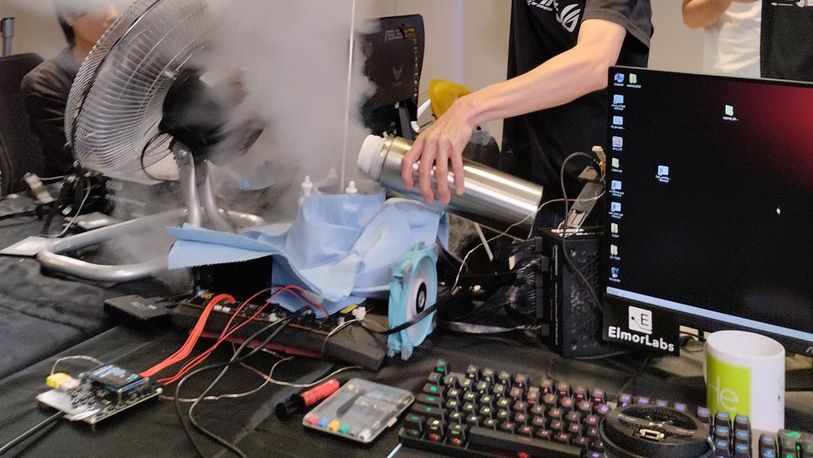Core i9 14900KF Breaks World Record, Almost Achieves 9.1GHz
The CPU frequency world records keep on coming.

The overclocking team from Asus has achieved a new CPU frequency world record with Intel's brand-new Raptor Lake Refresh Core i9-14900KF. The team was able to achieve a very impressive 9043.92GHz on a single P-core with liquid helium, breaking the previous world record by 35.1MHz.
The overclocking rig used to hit this new world record included Intel's brand-new Core i9-14900KF flagship CPU (no integrated graphics), 16GB of G.Skill Trident Z memory, an Asus ROG Maximus Z790 Apex Encore motherboard, and a 1200W Enermax PSU. For cooling, the team used liquid helium (rarer, colder, and more expensive than liquid nitrogen) to reach a minimum thermal threshold of negative 235C–240C. According to SkatterBencher, one of Asus' team members, it took the team a whole week to break the (now previous) CPU world record.
35MHz might not sound like a big margin (and it isn't), but in the land of CPU frequency records, any minute gains are huge. The previous world record was held by the same Asus overclocking team, using Intel's previous-generation Core i9-13900KF to hit 9.008 GHz back in December of 2022.
Naturally, the Asus team is not done yet with Intel's latest 14900KF CPU. After scoring their world-record result, the team pushed on and managed to briefly hit 9.1GHz before locking up. Sadly, the system was too unstable to validate the score, making it an unsuccessful 9.1GHz attempt. Nonetheless, their 9.1GHz screenshot shows there may be more in the tank for Raptor Lake Refresh's enhanced overclocking capabilities — we could see another new world record in the not-too-distant future.
Intel's i9-14900KF is the company's latest flagship CPU, sporting a lightly refreshed flavor of Intel's Raptor Lake CPU architecture. One of the tweaks Intel made for its latest refresh is the inclusion of a revised Intel 7 process node that improves the chip's base/boost frequencies and improves the chip's overclocking potential. The enhancements appear to have paid off, allowing SkatterBencher and his team to (re-)secure a world-record result with the new chip.
It's an exciting time for fans of this very niche CPU overclocking sport. This latest 14900KF result represents the third broken world record in under a year, all with Intel's 13th and 14th Gen chips. Before Intel's Raptor Lake chips stole the show, AMD was on top with a world record result of 8.722 GHz on the old Piledrive FX 8350, a record that had remained unbroken for eight years.
Get Tom's Hardware's best news and in-depth reviews, straight to your inbox.

Aaron Klotz is a contributing writer for Tom’s Hardware, covering news related to computer hardware such as CPUs, and graphics cards.
-
ezst036 ReplyAlvar Miles Udell said:CPU Overclocking is considered a sport now?
I could see it. If you want to see bizarre, check out hobby horse competition. -
cyrusfox Reply
I mean slap boxing is a thing, why not?Alvar Miles Udell said:CPU Overclocking is considered a sport now? -
derekullo How are any minute gains huge?Reply
Wouldn't that be ... huge gains?
Huge gains for whom? the electricity/helium producing companies?
If this article wasn't AI created I think AI could have helped lol! -
spongiemaster Reply
It's the difference between absolute and relative.derekullo said:How are any minute gains huge?
.11 seconds is a pretty minute amount of time, however that was how much Usain broke his previous world record in the 100M which was a huge margin. The previous 5 records combined dropped the 100M record by .10 seconds. -
bit_user ReplyThe team was able to achieve a very impressive 9043.92GHz on a single P-core with liquid helium, breaking the previous world record by 35.1MHz.
Heh, that was obviously meant to say "9043.92 MHz".
It's also funny how the article points out the significance of a mere 35.1 MHz, but then takes the liberty of rounding up their achieved speed by a whopping 56.08 Mhz!
🤣
WCCFTech did the same thing. I'm not sure who copied off of whom, but I think they both rip stuff from each other, these days. -
bit_user Reply
For many years, actually. They've been holding organized competitions for over a decade.Alvar Miles Udell said:CPU Overclocking is considered a sport now?
Toms once had a champion overclocker writing some articles for the site. I'll see if I can find them, but the site's search feature is so bad I'll probably have to resort to Google. -
spongiemaster Reply
If you read the article, you would see that the overclockers were able to boot the system at 9.1Ghz but it wasn't stable enough to get a verification of the clock speed for an official record.bit_user said:Heh, that was obviously meant to say "9043.92 MHz".
It's also funny how the article points out the significance of a mere 35.1 MHz, but then takes the liberty of rounding up their achieved speed by a whopping 56.08 Mhz!
🤣
WCCFTech did the same thing. I'm not sure who copied off of whom, but I think they both rip stuff from each other, these days.
-
bit_user Reply
How often is that the case, though? If validation didn't matter, it wouldn't be required.spongiemaster said:If you read the article, you would see that the overclockers were able to boot the system at 9.1Ghz but it wasn't stable enough to get a verification of the clock speed for an official record.
-
Order 66 10GHz is going to happen sooner rather than later. It's too bad Intel's prediction didn't come true.Reply
